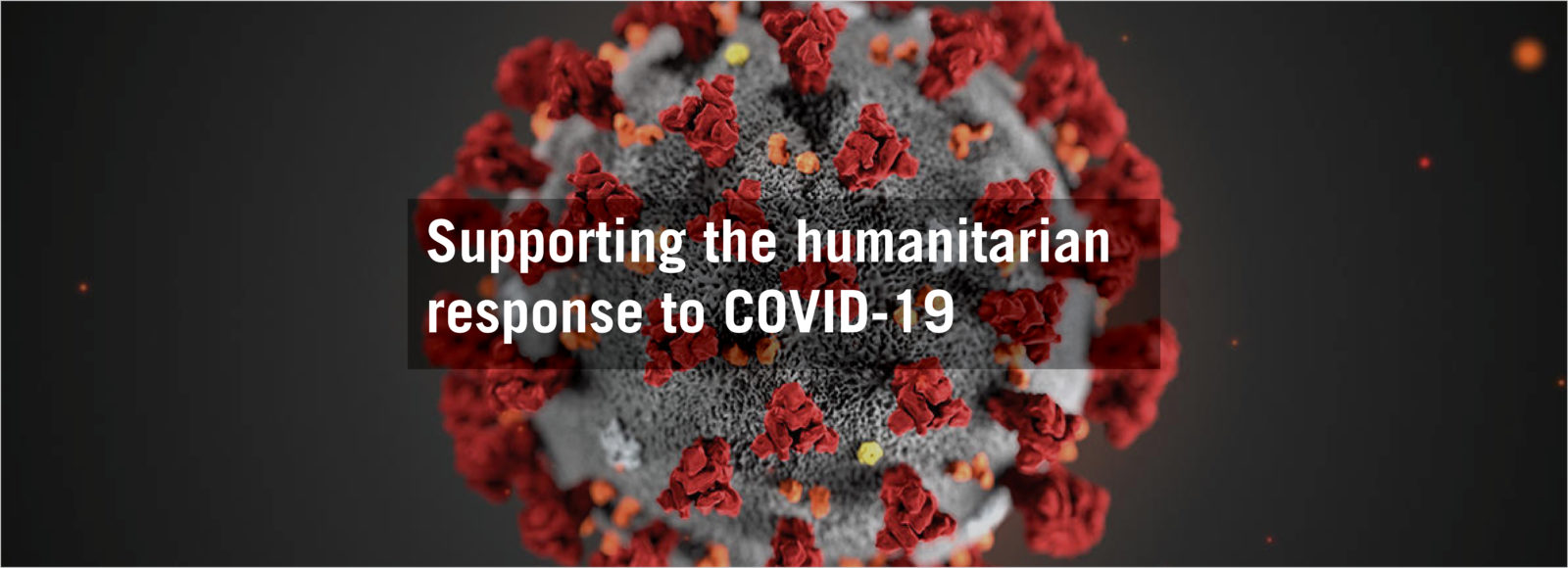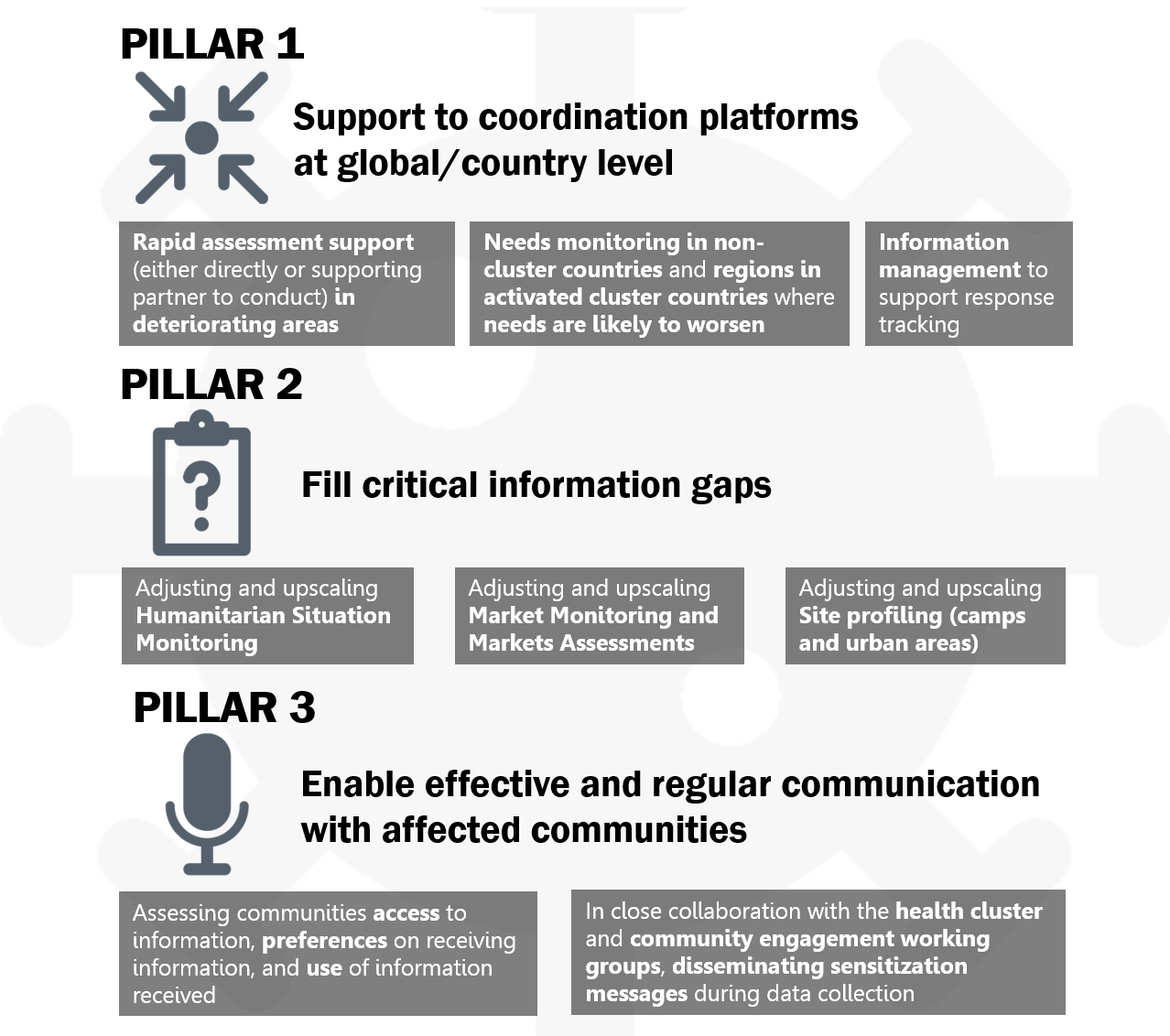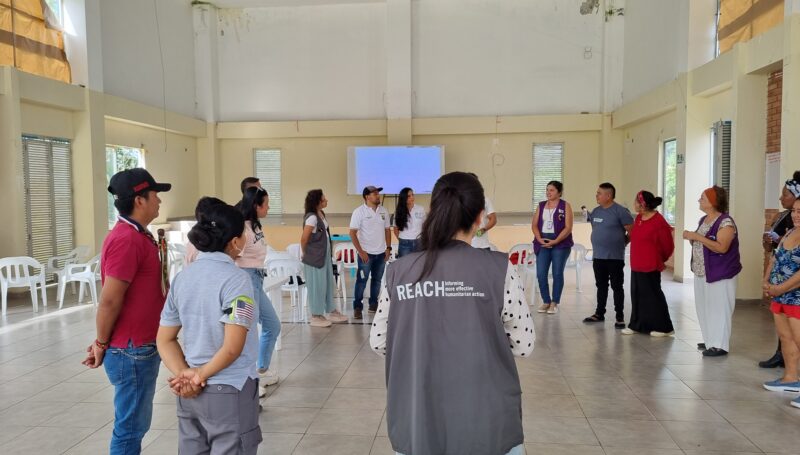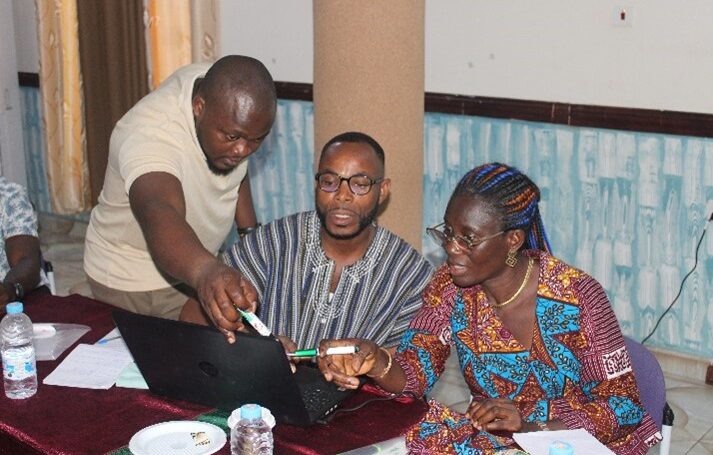As a humanitarian organization deployed, notably via its REACH initiative, in many vulnerable and crisis-affected countries, IMPACT is deeply concerned by the devastating impact the COVID-19 pandemic is having on the millions of affected people we seek to serve. Those who are already facing severe and extreme humanitarian needs risk being made even more vulnerable by the spread of the corona virus. Affected populations find themselves in places that are overcrowded and where public health and other services are already overstretched and have limited capacity. It is therefore of utmost importance to evaluate and monitor the situation of those who are already vulnerable in order to help communities prepare and respond to the ongoing spread of the virus.
The growing COVID-19 crisis threatens to disproportionately affect low income countries, not only as a health crisis in the short term but as a devastating social and economic crisis over the months and years to come. As the world braces against COVID-19, governments, health systems, and international organizations are grappling with the ways in which the pandemic will harm the most vulnerable members of society. In ongoing crises, humanitarian needs are likely to be exacerbated by the direct and indirect effects of the global spread of COVID-19. In addition to this, there is a risk that attention will be diverted away from continued humanitarian needs, which remain urgent to address, even as COVID-19 poses a risk to new population groups and territories.
Humanitarian actors are scaling up and reprogramming their activities in response to COVID-19, both in country and at the global level. As they do so, they are finding themselves in an unfamiliar territory, lacking the required tools and information for planning their response to the pandemic. In this context, up-to-date data collection efforts and analysis are critical to ensure humanitarian action is targeted effectively and the most vulnerable populations prioritized in the COVID-19 response. In particular, data and analysis will be needed to ensure new regions or countries affected by this crisis are monitored closely and the necessary action is up-scaled as required. In many countries IMPACT, notably through its REACH initiative, has been contacted to provide this support. In response, throughout its 25 countries of operations IMPACT has adapted its programming, scaling up remote data collection and analysis in order to provide an evidence base for humanitarian response planning to COVID-19.
In line with requests and consultations with its partners, IMPACT proposes to further upscale the following three sets of activities to support COVID-19 response efforts.
IMPACT’s CAPACITY
IMPACT is uniquely positioned to provide this support, notably through its REACH initiative. REACH plays a central and established role of support to humanitarian planning in 25 crises, as well as direct or proposed support to the global Health, WASH, Shelter, Education, Food security and Livelihoods clusters, and global coordination platforms on Cash response and Accountability to Affected Populations. In many countries in which it operates, IMPACT benefits from an unparalleled network of key informants, including in most remote areas, which could be leveraged upon to communicate with populations affected by or at risk of the consequences of COVID-19. IMPACT has adapted its country operations to support response leveraging and adapting existing and ongoing research to monitor and inform the humanitarian community about the vulnerability caused by COVID-19 and its impact on affected populations through ad-hoc briefing and analysis products. Many research tools and methodologies for collecting information employed by REACH have been altered to work remotely and geared to inform the effects of COVID-19 on markets, on the humanitarian situation, and on population movements.
1. Support to humanitarian coordination platforms at global and country level to enable evidence-based response planning
In this evolving global crises, humanitarian coordination platforms are required to rapidly track and plan a response to fast-changing needs across territories and population groups, often in areas that have previously not been the target of humanitarian efforts. In the past weeks IMPACT has received multiple requests from humanitarian coordination platforms for support them with additional expertise and capacity, including from the Health, WASH, FSL, Education, Shelter clusters, as well as OCHA, UNHCR and Cash Coordination platforms. To support in this critical task, IMPACT, through its REACH initiative, proposes the following support to global and, when relevant, in country coordination platforms:
- Supporting cluster efforts in monitoring changing needs, notably through rapid analysis and additional analysis conducted on existing data. REACH will capitalize on existing REACH data collection initiatives and publically available tools, such as FEWSNET and other global and in-country initiatives.
- In contexts where the cluster identified needs have rapidly deteriorated, there will be a need for rapid sectoral assessments to verify the scale and scope of the crisis. In those cases, REACH will support in designing rapid assessment tools, training partners to conduct rapid assessments and/or where relevant, conducting these rapid assessments directly (notably through remote data collection tools and methods).
- It will also be critical for planning and coordination to track how the response is scaling up or shifting activities to mitigate or respond to COVID-19. REACH proposes providing additional IM support to OCHA, clusters and the COVID taskforces as relevant to support in response tracking, analysis and outputs to enable coordination.
- Finally, at global level, IMPACT will support Global Clusters and Platforms with guidance, research, helpdesk, knowledge management to adapt their activities to COVID-19.
2. Fill key information gaps to enable COVID-19 response planning in contexts of crisis
In data-scarce contexts in which humanitarian actors operate, availability of up-to-date and reliable information will be critical for COVID-19 response planning. Up-to-date information is required to track how COVID-19 is exacerbating existing vulnerabilities and increasing humanitarian need. To support the availability of such data, IMPACT will adapt and upscale some of the data collection programs it implements through its REACH initiative. Specifically, the following REACH data collection initiatives (all implemented within the framework of humanitarian coordination platforms) have been identified as critical to support the Covid-19 response and to ensure continued humanitarian response in crisis-affected countries:
- Market monitoring and assessment is critical to track changing prices and supply chain disruptions to both directly inform cash responses and also to use prices as a proxy to monitor how livelihoods have likely been disrupted. In particular, to ensure maximal coverage and use of the price data produced, it is important this market monitoring is conducted in close collaboration with, and preferably through, the cash working group. REACH is proposing to adapt and scale up direct price monitoring data collection, streamlining partner price monitoring tools and collate ongoing price monitoring data to produce joint market price analysis for the cash working group (or equivalent) in country. REACH will use additional funds to scale up this initiative in existing and new countries, speed up data collection, analysis and output production to enable this to be a relevant and responsive tool for decision makers.
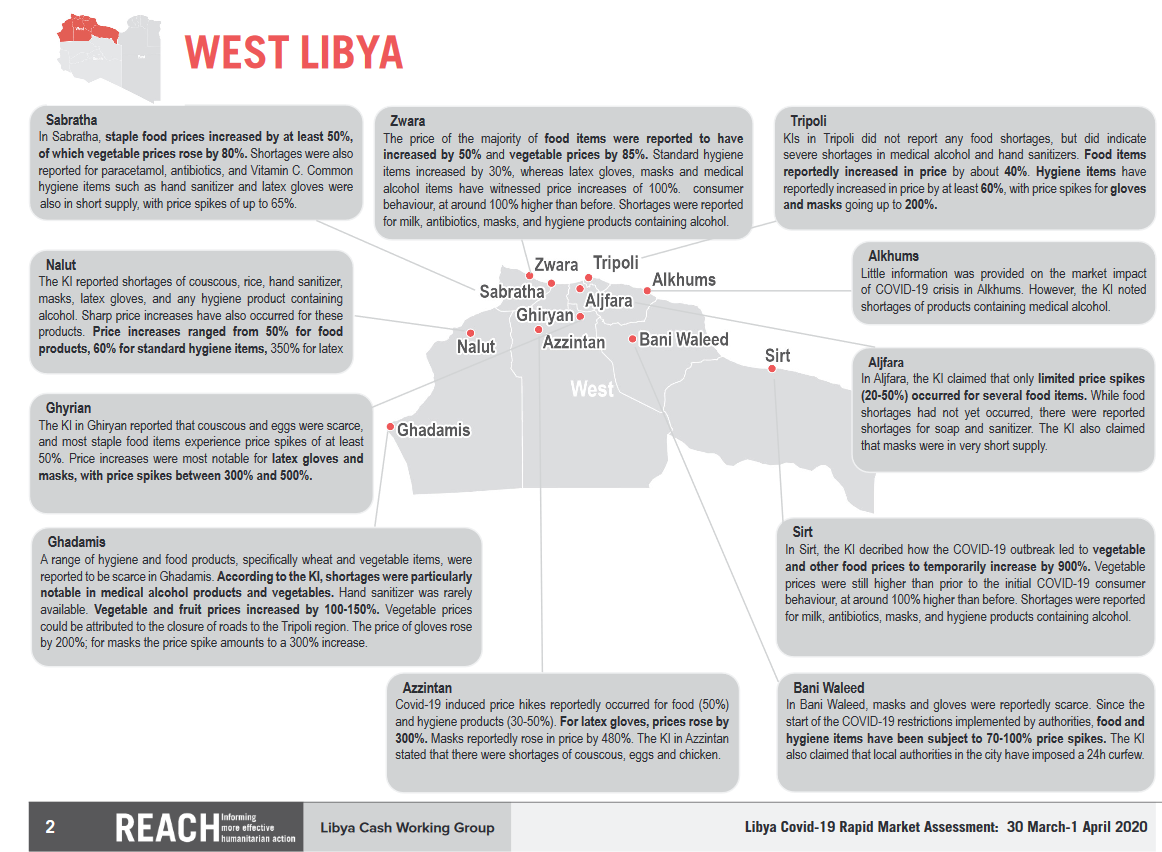
Latest rapid market assessment published by REACH, in collaboration with the Libya Cash Working Group, monitors the spikes in price of basic food and hygiene items since the outbreak of the pandemic in Libya. In Sirt, the Key Informant described how the COVID-19 outbreak led to vegetable and other food prices to temporarily increase by 900%. In Azzintan, latex gloves prices rose by 300% whilst mask prices rose by 480% making them unavailable to the most vulnerable.
- Site profiling and mapping of camps, camp-like settings and urban areas, using remote technologies and direct data collection (where possible), is critical to monitor the situation in most at-risk areas including a high density of particularly vulnerable populations. The monitoring will gather information on access to services and aid, as well as specific vulnerabilities to COVID-19, using indicators already established with the CCCM and other clusters. Together with UNHCR and CCCM, and in partnership with UNOSAT, REACH is identifying high priority sites and camps globally, to analyse existing data, complementing it with remote mapping and, where possible, direct data collection (including through remote interview of key informants) to assess camp and urban vulnerabilities. Data will be available on a dedicated online platform to enable easy consultation. REACH will use additional funds to pay for the adaptation and upscale of site profiling and maps.
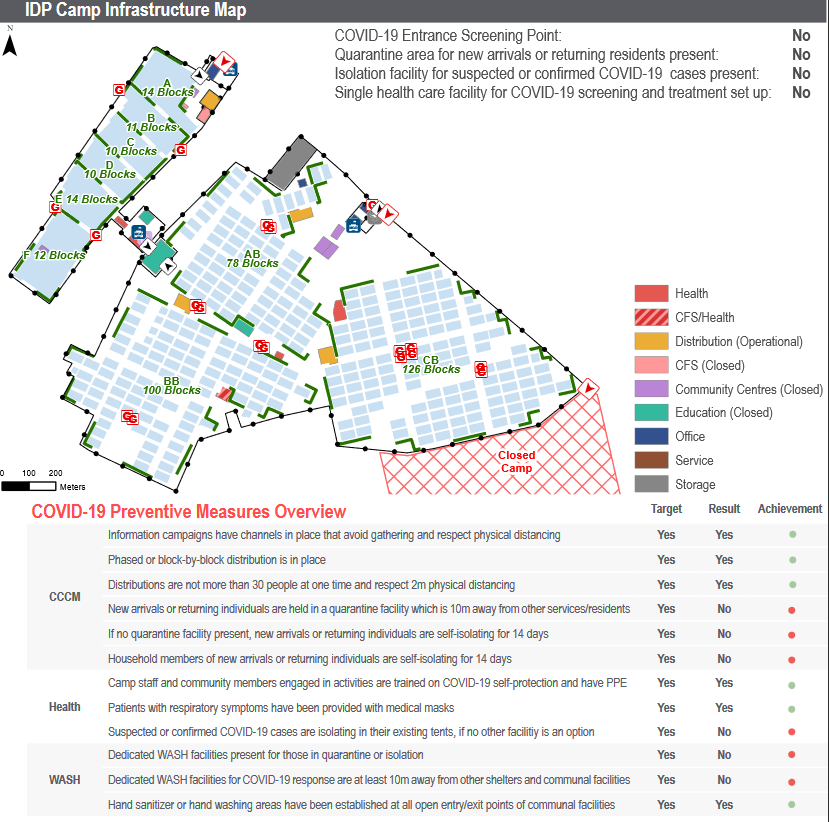
In Iraq, REACH teams mapped out populations vulnerable to COVID-19 among IDPs and returnees in over 135 existing camps in the country. Based on the assessment, REACH estimates that 27,500 IDPs in camp IDP, 97,600 out-of-camp IPD, and 312,300 returnees are particularly vulnerable to the spread of the coronavirus. Additionally, REACH mapped out IDP camp infrastructure to inform camp preparedness in relation to COVID-19.
- Humanitarian situation monitoring is critical to track changing multi-sector needs in hard-to-reach or already vulnerable locations. It is likely areas already affected by conflict, or facing acute humanitarian needs, will be severely affected by an outbreak of COVID-19. REACH conducts humanitarian situation monitoring in some of the world’s most acute humanitarian crises: South Sudan; the Sahel crisis (cross-border between Burkina Faso, Mali and Niger), and the inaccessible areas of CAR, Afghanistan, North East Nigeria, Somalia and Syria. REACH proposes to increase the geographical coverage of humanitarian situation monitoring in these areas to ensure needs are tracked and urgent humanitarian response can be swiftly scaled up when necessary. REACH will use additional funds to scale up this initiative in new regions and speed up data collection, analysis and output production to enable this to be a relevant and responsive tool for decision makers.
IMPACT/REACH IN UNIQUE POSITION TO ENHANCE THE RESPONSE CAPACITY OF COORDINATION PLATFORMS
Almost all REACH work is conducted in the framework of coordination platforms, be it at cluster/sector or inter-cluster/sector level. This means that across the 25 countries where it intervenes REACH has established partnerships with most clusters, as well as playing a central role at inter-sector level. Globally, REACH is the assessment focal point for WASH, Shelter, Education clusters, and leads the assessment related working group of the Food Security and Livelihoods (FSL) Cluster, and was recently approached for support on COVID-19 response by the Health cluster. REACH ensures regular exchanges with other clusters at country-level. At an inter-cluster level, REACH regularly engages with OCHA (JIAF, MSNAs, UNDAC, etc) and UNHCR both at field and country level.
3. Enable effective and regular communication with affected communities to support COVID-19 prevention and response efforts
Effective community engagement is central to an effective public health response. Leveraging on its outreach capacity (unparalleled in many countries), IMPACT can contribute to both disseminating key prevention messages to populations at risk, as well as receiving their feedback on their access and use of information received on COVID-19. In close collaboration with relevant global partners, such as Ground Truth Solutions and Translators Without Borders and the community engagement and communication working groups at the country level, IMPACT proposes to leverage on its large data collection operations to work on two concurrent activities:
- Assessing communities access to information, preferences on receiving information and use of information received to enable more effective and targeted community engagement efforts on COVID 19. This will be done as part of upcoming REACH situation monitoring and assessments, which will result in the publication of relevant products and analysis to be used for effective community engagement efforts on COVID-19
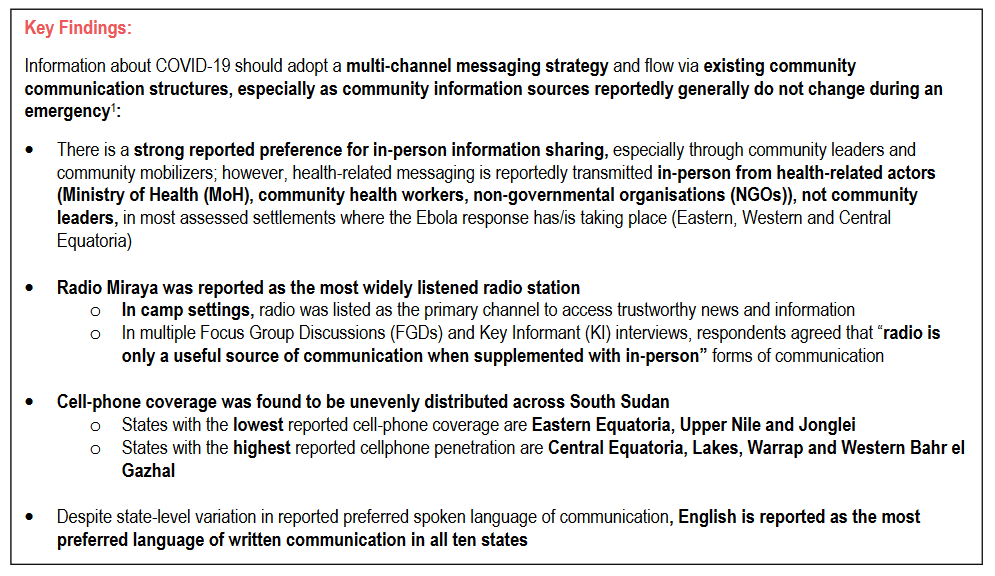
Key findings excerpt from the South Sudan “Trends in Communication Preferences and Modalities” report to inform aid actors on the most effective way to engage communities and reliably transmit information.
- In close collaboration with the health cluster and community engagement working groups, disseminating sensitization messages during data collection. In several countries with ongoing data collection, REACH has engaged with the health cluster to train up teams on key sensitization messages to pass during interviews. IMPACT proposes to scale up these efforts, to ensure all REACH enumerators can act as COVID-19 sensitizers, passing key health, sanitation and hygiene messages through ongoing data collection initiatives in all countries.
IMPACT/REACH IN AN UNIQUE POSITION TO ENABLE EFFECTIVE AND REGULAR COMMUNICATION WITH AFFECTED COMMUNITIES
IMPACT, notably through REACH, benefits from an unparalleled and tested network of enumerators and key informants in the countries where it operates. This has already been activated to support COVID-19 response planning. IMPACT also benefits from established partnerships with Ground Truth Solutions and Translators without Borders providing extra expertise and resources for AAP activities. Across its countries and at global level, IMPACT teams are proactively engaged in the community engagement and AAP working group.
ongoing and planned COVID-19 activities by IMPACT

For more information
All updates regarding our activities in relation to COVID-19 are posted in a dedicated thread on the REACH website.
Make sure to follow us on social media for live updates of when we publish our assessments @IMPACT_init and @REACH_info.
If you are interested in joining our mailing list and receiving comprehensive updates from our coverage related to COVID-19, as well as our usual activities, feel free to subscribe yourself to the REACH newsletter.
For requests, or media related queries, please write to us.





